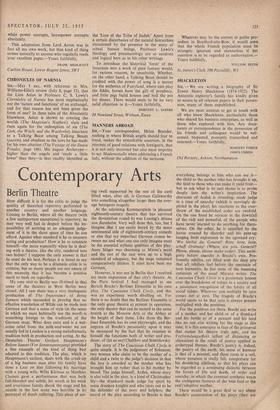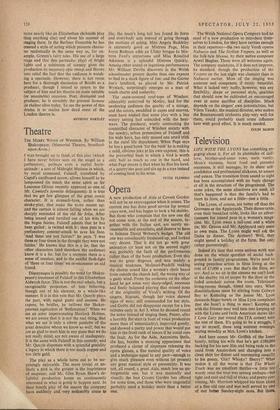Contemporary Arts
Berlin Theatre
How difficult it is for the critic to judge the quality of theatrical repertory performed in another country and another language. Coming to Berlin, where all the theatre (with a few unimportant exceptions) is repertory, he may very well feel in despair before the im- possibility of arriving at an adequate judge- ment of it in the short space of time he can afford. Against what standard is he to measure acting and production? How is he to orientate himself—the more especially when he is deal- ing with a theatre, like the city, sundered into two halves? I suppose the only answer is that he must do his best. Perhaps it is banal to say that the only way to be a dramatic critic is to criticise, but so many people are not aware of this necessity that it has become a positive merit to bash on regardless.
My own visit to Berlin was ill-timed in that some of the theatres in West Berlin were closed. All I saw there was a very inadequate production of The Importance of Being Earnest which succeeded in proving that no effective translation of Wilde can be made into German and that a sense of style (in the sense in which we most habitually use the word) is something foreign to the traditions of the German stage. What does exist and is a wel- come relief from the milk-and-water we are usually fed in London is a strong melodramatic tradition both in production and acting. At the Deutsches Theater Gerhart Hauptmann's Before Sunset (Vor Sonnenuntergang) provided a fine example of the kind of thing best adapted to this tradition. The play, which is Hauptmann's earliest, deals with the crack-up of a big business man after his family have done a Lear on him following his marriage with a young wife. Willy Kleinau as Matthias Clausen gave a performance that was both full-blooded and subtle, his wrath at his weak and avaricious family shook the stage and his suicide in the last scene was horrible in its portrayal of dumb suffering. This piece of act-
ing (well supported by the rest of the cast) lifted what, after all, is German Galsworthy into something altogether larger than the aver- age bourgeois tragedy.
At the adjoining Kammerspiele (a pleasant eighteenth-century theatre that has survived the devastation round it) was Lessing's Minna von Barnhelm. Very well done this, too, but I imagine that I am easily bored by the more sentimental side of eighteenth-century comedy or else that my imperfect German comes be- tween me and what one can only imagine must be the essential stylistic qualities of this play. Anny Su:4er was charming as Minna's maid / and the rest of the cast were up to a high standard of adequacy, but the stage remained comparatively lifeless. It must have been my German.
However, it was not in Berlin that I received my main impression of that city's theatre. At the Paris festival I had managed to see Bertolt Brecht's Berliner Ensemble in his own play, The Caucasian Chalk ,Circle, and this was an experience worth de,'elling on. For there is no doubt that the Berliner Ensemble is the only great theatre at present in operation, the only theatre that can be named in the same breath as the Moscow Arts or the Abbey at the height of their fame. Like them the Ber- liner Ensemble has its own playwright, and the impress of Brecht's personality upon it may be measured by the fact that he resumes in himself the functions both of writer and pro- ducer, of (let us say) Chekhov and Stanislaysky.
The story of The Caucasian Chalk Circle is quite simple. It is the judgement of Solomon; two women who claim to be the mother of a child and a twist to the judge's decision in that the boy is awarded to the mother who has brought him up rather than to his mother by blood. The judge himself, Azdak, whose story is also told in the play, is a kind of Christopher Sly—the drunkard made judge for sport by some drunken knights and who turns out to be the defender of the poor and helpless; the moral of the play according to Brecht is that
everything belongs to him who can use it— the child to the mother who has brought it up, the field to those who can make it yield fruit— but to ask what is its real theme is to probe deeply into the writer's inspiration. The character of Azdak is revealing; made judge in a time of anarchy (which is movingly de- picted in the play), his reactions to the over- throw of the established order are twofold. On the one hand he rejoices in the downfall of the rich and powerful, of the people who have never learned to do anything for them- selves. On the other, he is appalled by the havoc created by disorder and his pent-up longing finds expression in the agonised cry: 'Wo bleibst du, General? Bitte, bitte, bitte, schaff Ordnung' (Where are you, General? Please, please, please make order). This ambi- guity before anarchy is Brecht's own. Pro- foundly nihilist, yet filled with the deep pity that all nihilists feel before the spectacle of torn humanity, he has none of the bouncing optimism of the usual Marxist writer. The Caucasian Chalk Circle is a passionate lament over the breakdown of values in a society and a passionate recognition of the falsity of all social values. Whatever you multiply by zero comes out at zero. The tragedy of Brecht's world seems to be that zero is always present multiplied with the positives.
For the positives are there. Brecht can write of a mother and her child or of a drunkard and his bottle or of a peasant and his land \ like no one else writing for the stage at this time. It is this assurance in face of the primeval that makes his theatre truly epic, and his Verfremdungsellekt (effect of distancing or alienation) is the result of poetry applied to archetypal themes. Brecht's poetry is, indeed, the poetry of the earth; his sense of humour is that of a peasant, and these roots in' a soil, whose presence is really felt, compensate for his devouring nihilism, so that his plays can be regarded as a continuing dialectic between the forces of life and death, of order and anarchy, in which the eventual synthesis wears the ambiguous features of the wise fool or the real /adoptive mother.
There would be a great deal to say about Brecht's construction of his plays (they are more nearly like an Elizabethan chrbniele play than anything else) and about his manner of staging them. In the Berliner Ensemble he has created a style of acting which presents charac- ter realistically in the same way as, for ex- ample, Grimm's fairy tales. His use of a large stage and (for this particular play) of bright lights and a minimum of scenery gives the production its necessary epic sweep and throws into relief the fact that the audience is watch- ing a spectacle. However, there is not room here for a thorough discussion of Brecht as a producer, though I intend to return to the subject of him and his theatre on some suitable (or unsuitable) occasion. Poet, dramatist and producer, he is certainly the greatest homme de theihre alive today. To see the power of this drama is to realise how dead most of the London theatre is.
ANTHONY HARTLEY



















































 Previous page
Previous page